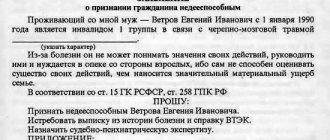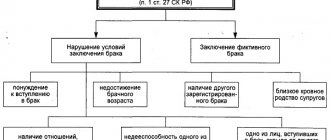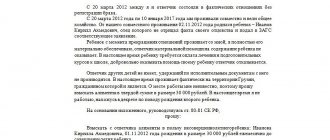Sometimes situations arise in life when you want to recognize your relatives as incompetent. Of course, this is a rather delicate issue that always causes remorse, as well as a feeling of guilt towards the person. Unfortunately, a person with a mental illness cannot evaluate either his own actions or the actions of other people, as well as distinguish truth from lies, and establish the true motivation of those who offer them dubious deals. This can lead to the fact that a person may enter into an agreement to sell an apartment, becoming a victim of scammers.
When it comes to resolving family issues, a citizen deprived or having limited legal capacity, for example, an alcohol abuser, will not be able to enter into transactions without the consent of his guardian or trustee. In a legal sense, deprivation of legal capacity is interpreted as a restriction of a citizen’s rights that contribute to the emergence, change or termination of civil legal relations. A citizen who does not understand the meaning of his actions and cannot direct them due to the presence of a mental disorder, according to Art. 29, art. 30 of the Civil Code of the Russian Federation may be declared incompetent by the court.
Concept of loss of legal capacity
Deprivation of legal capacity
A person who has lost his legal capacity will not be able to make any transactions (concluding contracts, going to court, etc.), except for small everyday transactions. All legal actions will be performed for him by his guardian, who is responsible for representing the interests of the incapacitated citizen. A guardian is appointed by the guardianship and trusteeship authorities. Usually he is a close relative of the citizen who is being deprived of legal capacity.
Limitation of legal capacity
In case of limitation of legal capacity, a guardian is appointed to the person. Such a person will not be able to perform the following actions without the consent of the trustee:
- Acquire, sell, donate, bequeath, exchange property or dispose of it in any other way, with the exception of carrying out small household transactions;
- Independently receive income: wages, pension, author's fee, amounts that a person receives after completing work under a contract, benefits, other remuneration.
Deprivation of legal capacity can only occur through a judicial procedure. Typically, this process lasts approximately 6-8 months. This is a rather complicated procedure, so to carry it out correctly, you need to contact professional lawyers from Law Office No. 46 “Zanevskaya”. The legal literacy of our specialists and impressive experience in successfully resolving cases mean that you will be provided with competent representation in court.
Deprivation of a citizen's legal capacity
A person can be recognized as incompetent if and only if the citizen has a mental disorder, as a result of which he cannot control his actions and be aware of his actions. Who can file an application for deprivation of legal capacity in court in accordance with Art. 281 Code of Civil Procedure of the Russian Federation?
- Family members;
- Close relatives of the citizen. This category includes brothers, sisters, children and parents of the designated person;
- Guardianship and trusteeship authorities;
- Psychiatric or psychoneurological institutions.
In the first or second cases, documents that confirm the existence of close family relationships should be attached to the application. If a citizen's legal capacity is limited due to drug or alcohol abuse, an application may be submitted by:
- Family members: spouse, parents, adult children, disabled dependents who live with the citizen against whom the case is being conducted, as well as other relatives;
- Guardianship and trusteeship authorities;
- Psychiatric or psychoneurological institutions.
Recognition of incapacity or limited legal capacity
November 11, 2021 4:35 pm
Courts tend to rely on the expert's findings, since there is usually no other evidence of mental disorder
On November 11, during the regular training webinar of the FPA RF, lawyer Yuri Ershov, candidate of legal sciences, gave a lecture on the topic “Features of the work of a lawyer in cases of declaring a citizen incompetent and restoring legal capacity.” He called on his colleagues to demand, in the interests of his principal, that the issue of not only his full, but also limited legal capacity be investigated, since the status of limited legal capacity is more in line with the interests of the person, gives more freedom and opportunities, including those that can then become stages for restoration of full capacity.
Having called legal capacity a key category that makes up the legal status of a citizen, the lecturer noted that, unlike legal capacity, it can change throughout life. “In addition to natural changes associated with age, a person may lose legal capacity on grounds established by law, which in general, as a legal institution, is due to concern for the protection of his interests. But in practice, recognition as incompetent often becomes a way to violate a person’s rights, put him under control, and solve a related problem (most often in the field of housing),” Yuri Ershov pointed out. In some cases, a person may be recognized as having limited legal capacity or unable to make transactions.
The role of the lawyer in cases involving loss of legal capacity becomes key, since what is at stake is literally “the right to live one’s own life.” In addition, sometimes applications for declaring a citizen incompetent contain very far-fetched grounds, they say, he refuses the indicated operation or keeps a starting pistol at home.
Considering that often the “deprived of legal capacity” is in a state of imprisonment - in a psychiatric hospital or a psychoneurological boarding school (PNI), a lawyer, according to the lecturer, becomes his only chance to protect his interests.
Yuri Lvovich gave examples in which the procedure for deprivation of incapacity was “used for other purposes”, and drew the attention of listeners to the fact that it is important for a lawyer to achieve full compliance with the procedural rights of clients; they are very often violated in such cases: they do not serve an application with attachments, they do not give opportunity to get acquainted with the case, are not notified about it.
When a person is in a hospital or mental health facility, at some point he can simply be “introduced” into a room where people are sitting who are unfamiliar to him, who can ask several questions about his life, and the person, perceiving this as some kind of “next examination”, It turns out he “took part in a competency hearing.”
The expert recommended separately protecting a person’s right to respect for his dignity: “it is unacceptable and inadmissible for him to be in court in a washed robe or pajamas, which makes everyone present perceive him as sick and incompetent, and also creates discomfort for the person himself.”
Yuri Ershov spoke about rather strange cases associated with making a psychiatric diagnosis, including an experiment in a specialized clinic, during which completely healthy people were given an incorrect diagnosis only because the patient obviously cannot be healthy.
In the case of a mental disorder, a person may be declared incompetent by a court if he lacks the ability to understand the meaning of his actions or the ability to direct his actions. And in court, the key, and in many cases the only evidence, becomes the conclusion of a forensic psychiatric examination based on the results of a routine oral conversation with the subject.
Courts tend to “join” expert conclusions, citing the fact that they come from specialists, when in reality this is just one piece of evidence that does not have any advantages over the rest and must be assessed in conjunction with them. But in reality, there is almost no “other” evidence, the lecturer emphasized. He noted that the lawyer’s task is to collect such evidence, help determine the circle of witnesses, written evidence, etc. Moreover, “it is important to include as much material as possible confirming the person’s position before the case is sent for examination, so that experts evaluate not only what presented by the initiator of the case." A person whom relatives, medical institutions, and sometimes even local authorities want to recognize as incompetent, in some cases is not even recognized as a party to the case; he has no more rights than domestic animals.
The expert called on his colleagues to demand, in the interests of his principal, that the issue of not only his full, but also limited legal capacity be investigated, since the status of limited legal capacity is more in line with the interests of the person, gives more freedom and opportunities, including those that can then become stages for restoration of full capacity.
According to him, a useful defense tool is being present during the examination, recording its progress, and exercising the right to provide explanations to experts. This will make it possible to counter the subjective and biased presentation of the conversation in the text of the conclusion.
Yuri Ershov considers it a very valuable and effective mechanism for protecting the interests of the principal to petition for the interrogation of experts by the court and to seek their explanation and motivation for their conclusions: separately - about the ability to understand the meaning of their actions, separately - about the ability to manage them. If the expert report is not carried out properly, the lawyer must request an additional or re-examination.
In conclusion, Yuri Ershov answered questions from the webinar participants.
The speaker's presentation can be found here.
Please note that the webinar will be repeated on Saturday, November 14th.
SharePrint Direct link to the material:
Share
Documents required by the court to recognize a citizen as incompetent
- A statement that you want to declare the person incompetent;
- Documents indicating that there is a close family relationship between you and the citizen (for example, a birth certificate);
- Documents that confirm that a citizen has a disease or disability.
Recognition of a citizen as incompetent or partially capable is possible as a result of special proceedings. The application must be submitted at the place of residence of the person whose legal capacity the applicant wants to limit or deprive. If the place of residence of the citizen in respect of whom we are talking about declaring him incompetent is a psychiatric or psychoneurological institution, then the cases should be considered at the location of these institutions.
Who can be declared incompetent?
Not every citizen can be declared legally incompetent. The law establishes a clear list of persons who can be declared legally incompetent. Such persons include citizens who meet two criteria:
- they do not understand the meaning of their actions;
- they cannot independently direct their actions.
At the same time, such a citizen can be either deprived of legal capacity or have it limited. This depends on the degree of impairment of his ability to understand his actions and direct them. For example, if such a citizen can still understand the meaning of his actions and manage them, but only with the help of other persons, the court limits his legal capacity. To be deprived of legal capacity, a persistent lack of understanding of one’s actions and a complete inability to direct them is necessary.
It is also worth remembering that the court can limit the legal capacity of a citizen who was previously recognized as completely incompetent, but only if his mental and physical condition improves so much that he will be able to understand and direct his actions.
Can an alcoholic be declared incompetent?
The answer to this question is unequivocal - it is impossible. A citizen who abuses alcoholic beverages or alcohol can only be recognized as having limited legal capacity at the request of his family members. However, if such a citizen, as a result of the use of alcoholic beverages or drugs, ceases to understand the meaning of his actions and manage them (even with the help of strangers), then he can be declared incompetent on the basis of a mental disorder caused by the relevant substances.
Can an elderly person be declared incompetent?
Old age, in itself, is not an absolute basis for declaring a person incompetent. Although an elderly person no longer has the same intelligence as young people, an elderly person can be declared incompetent only on the basis of a mental illness, as a result of which he no longer understands the meaning of his actions.
Progress of the trial
According to Art. 283 of the Code of Civil Procedure of the Russian Federation, in order to recognize a citizen as incompetent or partially capable, a forensic psychiatric examination is appointed. It should be prescribed if there is evidence of a person’s dementia or mental illness. The reasons for this may be:
- providing a certificate of registration with a psychiatrist;
- providing a certificate of congenital mental disabilities;
- providing a certificate of injuries that could lead to mental impairment of the citizen;
- acts that indicate deviations from normal behavior;
- court ruling on release from criminal liability and sending a person for compulsory treatment to a psychiatric hospital, etc.
In the absence of sufficient evidence that a citizen is mentally ill or weak-minded, a forensic psychiatric examination should not be ordered. In case of obvious evasion of the person against whom the case is being conducted from undergoing an examination, the court, at a court hearing with the participation of a prosecutor and a psychiatrist, may forcibly direct the citizen to undergo it.
Citizen participation in the case
For an objective consideration of the case, the participation in the case of the citizen himself, in relation to whom the question of recognizing him as incompetent or partially capable, is raised, the applicant, the prosecutor and a representative of the guardianship and trusteeship authorities are required. The person against whom the case is being conducted must be summoned to a court hearing, where he is given the opportunity to express his point of view in person or through chosen representatives. Citizen participation is permissible only if it does not pose a danger to his life or health, or the life or health of others.
If a citizen’s personal participation is impossible due to health reasons, the case will be considered by the court at the citizen’s place of residence (location), including in the premises of a psychiatric or psychoneurological institution with the participation of the citizen himself. A citizen who has been declared legally incompetent by a court may appeal the court's decision to higher authorities personally or through representatives. This is carried out only if the court of first instance did not provide the person with the opportunity to express his position personally or through representatives. When the court considers your application, it will make a decision on the case. According to Art. 285 of the Code of Civil Procedure of the Russian Federation, a court decision according to which a citizen is limited in legal capacity is the basis for appointing a guardian for him, and if a person is declared incompetent, a guardian. They must be appointed by representatives of the guardianship and trusteeship authority.








